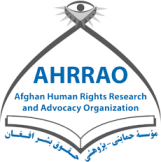
Afghan Human Rights Research and Advocacy organization AHRRAO was founded by a group of activists from northern Afghanistan with diverse ethnic backgrounds who have been working in the field of development and human rights for several years.  Their vision for Afghanistan is to see a society based on democracy and the rule of law in accordance with human rights; a society where all people are aware of their rights and dare to claim them through the rule of law.
The organizations mission is to support the establishment of a capable human rights movement to increase the understanding and respect for human rights and the rule of law for all in Afghanistan.
Please now read the Answer and Question Interview conducted with Hayatullah Jawad, the Executive Director at AHRRAO.
1. Â What does Peace in Afghanistan mean to you/the organisation?
My findings from people and my community about peace is; NO FIGHTING. They want minimum security for people to work, for children to go to school, for women to have the freedom to travel wherever they like without any male member of their families as their supporter. My personal point of view is that the minimum standard of peace is an atmosphere within the society in which people can practice their civil, political, cultural, social and economic rights in peace.
2.  Over the past 12 years what have been the best achievements for peace development in Afghanistan? Would you say these changes are sustainable? If not, in what ways can we help make these positive changes more sustainable?
In my opinion, there was/is no systematic agenda for peace in Afghanistan. Our governmental agenda for peace is not transparent enough, so it cannot mobilize all Afghans to support it. Therefore, I cannot call its achievements sustainable. Other important areas that need attention to seriously support peace in Afghanistan are democracy building and the election process. Over the past 12 years, democracy and elections (however defective) have been a good strategy to support peace by dividing power and governmental resources among power brokers and this needs to be supported. Without this type of initiative, there is strong potential of another civil war in Afghanistan. This makes the upcoming election very important to as we hope for a peaceful transfer of government in Afghanistan. We need to save the current situation at least for another 15 to 20 years to have a good and supportive educated generation for peace.
 3. What are some of the main challenges to peace within Afghanistan? Are there differences between urban and rural areas?
Regarding to challenges to peace in Afghanistan, explaining them in detail it would be like writing a book. Instead, I am going to draw your attention to two main issues:
A.     External interference: Afghanistan’s location makes it a geopolitical hotbed leading to many countries becoming involved in Afghanistan’s war. Now, due to the long term nature of this war and the nature of neighboring countries’ governmental system (like the Iranian regime and Pakistan’s government and army), these countries have strategic interests in Afghanistan and will never want a peaceful Afghanistan with a strong government that would not afford them the privileges they want.
B.     Internal problems: The most common and serious problems in Afghanistan are illiteracy and religion. Other countries that have interests in Afghanistan are using these two serious problems to destabilize the country in efforts to guarantee their interests. They prey on Afghanistan and our country’s uneducated population.
Yes, there is a big difference between rural and urban areas in terms or understanding and supporting peace. Rural areas are less educated and are often the start of war and conflict.
4. Â In what ways can peace be developed in Afghanistan? And how can both Afghans and the international community provide support?
Peace development is not a short term process. It needs at least 20 to 30 years to bring peace in a country which has never experienced the real meaning of peace. To support peace in Afghanistan, the following steps should be taken seriously:
A.  A formal education system needs to be standardized in Afghanistan. There are many agents from other countries that are destroying Afghanistan’s education system as well as wide spread discrimination among Afghanistan’s ethnic groups. With support from the international community, Afghanistan’s Ministry of Education should be redesigned.
B. Civil Society of Afghanistan should be supported to: Firstly understand peace and secondly begin a systematic advocacy for peace and educate people in rural areas based on a long term strategic plan that involves all Afghans.
5. What are your aspirations for peace in Afghanistan and how are you offering your support?
As a member of this young generation and a civil society activist who was born in wartime and has grown up in war, I need peace like a thirsty person needs water.
I am learning peace, educating people and generating theories for supporting peace in my country. I feel obligated to reply to you because you are supporting peace in my country and any other CSO or organization that supports peace in Afghanistan. I see myself supporting peace in my country through education and providing opportunities for people to talk and learn about peace and human rights. I want to teach people to respect each other and support the rule of law in our country.
If you would like to find out more about AHRRAO or to make contact please visit their website.
0 Comments